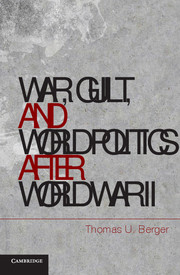1 - Politics and Memory in an Age of Apology
Published online by Cambridge University Press: 05 August 2012
Summary
We live in an age of apology and recrimination. Over the past two decades, the world has witnessed an unprecedented outpouring of expressions of contrition by political leaders for past injustices their countries are held responsible for. At the same time, there has been an upsurge in demands for apologies, restitution, and a variety of forms of compensation on the behalf of groups and nations that feel they have been victimized. The Federal Republic of Germany may well be the paradigmatic example of this trend. More than sixty years after the end of World War II, it continues to wrestle with the legacies of the Third Reich, offering long-overdue compensation to the hundreds of thousands of former slave laborers while arguing with the governments of Poland and the Czech Republic over how to commemorate the millions of ethnic Germans who were driven out of Eastern Europe in the aftermath of the war. Germany might seem a special case in this regard, burdened as it is by an especially terrible history. Yet other examples abound: the bitter disputes between Russia and its neighbors over how to view the Soviet Union, the disagreement between Israelis and Palestinians over whether the Arab population in Israel had fled or were driven from their homes in 1947, or repeated accusations in Asia that Japan has failed to apologize adequately for its history of atrocity and aggression before 1945, and the list could well be extended almost ad infinitum.
That the past and how it is represented is of political importance is nothing new. Rulers have long realized George Orwell's dictum, “Who controls the past controls the future; who controls the present controls the past.” What is novel about the current situation, however, is the degree to which history and memory have become contested, both domestically and internationally. In the past, states, by and large, have been able to promote laudatory depictions of their history by suppressing or driving under ground dissident, critical narratives, at least in the realm of public discourse. Under the modern Westphalian system of juridically independent, sovereign states, governments were given the right to do so without interference from outside actors. Yet in many liberal democracies, the dark and negative aspects of their national history have today become accepted, even required, parts of how the past is depicted.
- Type
- Chapter
- Information
- War, Guilt, and World Politics after World War II , pp. 8 - 34Publisher: Cambridge University PressPrint publication year: 2012



